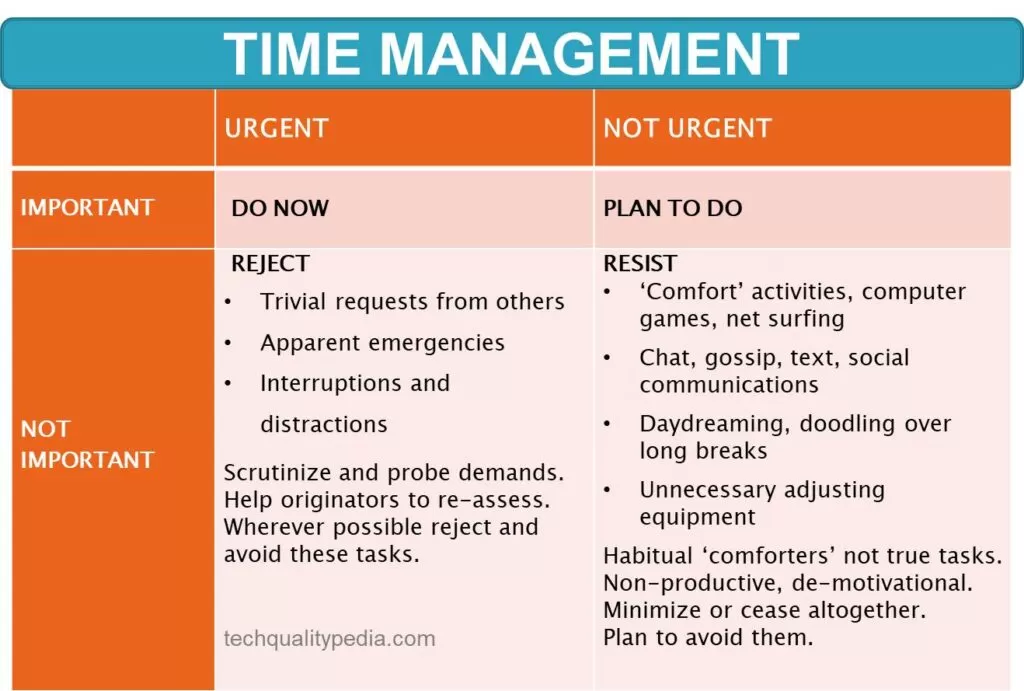Time Management and Self Discipline are essential for professional growth, and becoming a successful Leader/Manager/Student/Businessman.
Table of Contents
What is Time Management?
Time management is the process of organizing and planning how to divide your time among various activities.
Time Management is about working smarter, not harder, to achieve more in less time.
Simply Time Management is – making the most of your time and energy.
Myths about Time Management
- Time management is nothing but common sense. I do well in school, so I must be managing my time effectively.
- It takes all the fun out of life!
- Time management? I work better under pressure.
- No matter what I do, I won’t have enough time!
Benefits of Time Management
The Truth About Time Management or Benefits are:
- Increases productivity
- Reduces stress
- Improves self-esteem
- Helps to achieve balance in life
- Increases self-confidence
- Helps you to achieve your goals
- More focused on personal & organizational goal
- More co-operation from family and work team
- Increase work efficiency
- Recognition & awards
Why is Time Management Important?
Impact on Personal Life
Effective Time Management results in better work-life balance, reduced stress, and more quality time for family, self-care, and hobbies.
Benefits for Professional Career Growth
In the office or workplace, managing time effectively enhances productivity, helps meet targets/goals, and enhances career opportunities.
Cost of Poor Time Management
Ineffective time management can result in stress, missed deadlines, and a chaotic personal and professional life. Relationships and work performance may suffer as well.
Managing Time
There are 168 hours in every week. How are you spending yours?
- Meeting new people
- Going to class
- Sleeping
- Going to the Gym
- Getting ready for class
- Working on campus
- Shopping for groceries
- Caring for family members
- Going out with friends
- Cultivating a relationship
- Going to office hours
- Volunteering
- Doing library research
- Studying for tests
- Playing an instrument
- Checking email
- Chatting with friends
- Exercising
- Catching up!
- Commuting
- Getting around campus
- Trying to unwind
- Attending events on campus
- Helping a friend
- Revising your essay
- Getting coffee
- Taking a nap
- Keeping in touch with family
To utilize or manage 168 hours effectively, you have to do some planning to achieve your goals/targets or to become a successful leader or successful businessman.

Steps to Managing Your Time
- Set goals
- Set reasonable expectations (and remember that no one’s perfect)
- Make a schedule
- Revisit and revise your plan
Time Management | Energy
The most overlooked aspect of time management is your energy level.
- Evaluate your energy level at different times of the day.
- Schedule tasks when you have the energy level to match.
- If you are a “morning person,” seize the early hours to study and do assignments that require focus.
- If you are an “evening person,” make sure that you are being productive and not sacrificing sleep for extra hours to socialize.
- Losing sleep is the easiest way to sabotage your energy level!
Where to start? Set Goals | What is Important?

- Make your goals specific and concrete. Don’t be vague.
- Make your goals specific and concrete. Don’t be vague.
- Set both long-term goals and short-term ones to support them.
- Set a deadline for your goals.
- Integrate your goals: school, personal, and career.
- Realize that goals change, but know which goals to stick to!
- Set SMART goal
- Plan your daily activities (DWM)
- Develop a habit of written goals
- Regular tracking of progress
From Your Goals…Set priorities
- What’s important and what isn’t?
- What order do things need to be done in?
- Once you know what your priorities are, you need to plan out a schedule for the semester, the week, and the day.
- Acknowledge the realities of college schedules.
- Planning may seem hard at first, but the more you do it, the easier and more natural it gets.
Organizing Your Time | Do you have a schedule?
- Set realistic goals, there are only 24 hours in a day.
- Use your spare time to review.
- Study at the same time each day: make it a habit
- Divide study time into manageable chunks
- Don’t forget to reward yourself when you do something right!
“Work smarter, not harder.”- Alan Lakein
Revisit and Revise Your Plan
Are you making progress?
- Now that you’ve been paying attention to your schedule, how are you actually using your time?
- Which tasks were you able to do? What didn’t get done?
- Was your energy level appropriate? Your stress level?
- What changes need to be made to your weekly schedule?
- What are persistent time wasters?
- Could better communication have helped you stick to your plan?
- Was procrastination an issue?
How to Overcome Procrastination?
- Win the mental battle by committing to being on time.
- Set and keep deadlines.
- Organize, schedule & plan.
- Divide a big job into smaller ones.
- Find a way to make a game of your work or make it fun.
- Reward yourself when you’re done.
- Tell your friends and roommates to remind you of priorities and deadlines.
- Learn to say “no” to time wasters.
How to Tackle Time Wasters?
- Learn to recognize when you’re wasting time.
- Decide what you need to do and can realistically do.
- Learn how to say “NO” when you don’t have time.
- Return calls at your convenience. The phone is a major time killer.
- Learn to say “I can’t talk right now. I’ll get back to you.”
- Wasting time is often linked to a lack of self-discipline.
- Ask yourself, “Do I really need to do this or not?”
Revisit Your Values
- Knowing what is most valuable to you gives direction to your life.
- Your energy should be oriented first toward things that reflect the values that are most important.
- Examine your values to help you make time management decisions.
REVISE and PREVIEW
Staying on top of things…
- Immediately note all changes.
- Meeting additions/cancellations
- Work schedule changes
- Upcoming visitors, etc., etc…
- Preview the upcoming week making any necessary adjustments.
- Preview each day to see what might happen…
REVIEW
- Time and energy management can make you more productive and reduce your stress level.
- The Three Steps
- Set goals
- Make a schedule
- Revisit and revise your plan
- Be tough with your time. Actively avoid procrastination and time wasters. Learn to say “no” to distractions.
- Employ a variety of time management strategies to maximize your time.
- Relax and enjoy the extra time that you’ve discovered!
